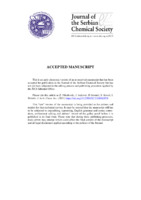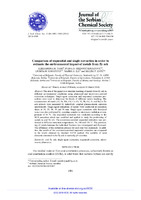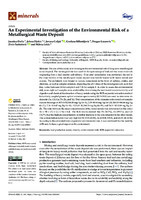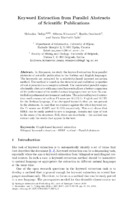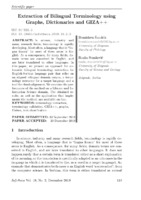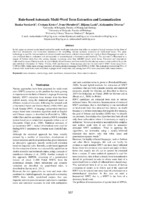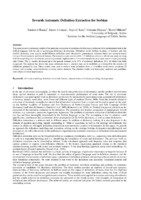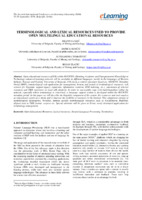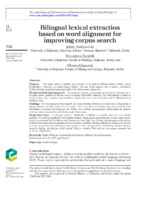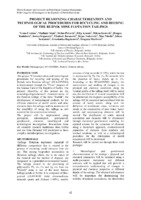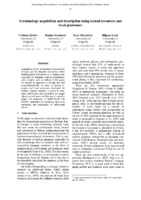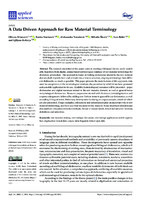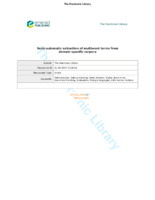Претрага
185 items
-
Some examples of interactions between certain rare earth elements and soil
Zlatko Nikolovski, Jelena Isailović, Dejan Jeremić, Sabina Kovač, Ilija Brčeski. "Some examples of interactions between certain rare earth elements and soil" in Journal of the Serbian Chemical Society, National Library of Serbia (2021). https://doi.org/10.2298/JSC211006095N
-
Comparison of sequential and single extraction in order to estimate environmental impact of metals from fly ash
летећи пепео угља, екстракција са једним агенсом, секвенцијална екстракција, микроталасне пећнице, ултраталасиAleksandra Tasić, Ivana Sredović-Ignjatović, Ljubiša Ignjatović, Marija Ilić, Mališa Antić. "Comparison of sequential and single extraction in order to estimate environmental impact of metals from fly ash" in Journal of the Serbian Chemical Society (2016). https://doi.org/10.2298/JSC160307038T
-
An Experimental Investigation of the Environmental Risk of a Metallurgical Waste Deposit
Jasmina Dedić , Jelena Djokic , Jovana Galjak, Gordana Milentijević, Dragan Lazarevic, Živče Šarkočević, Milena Lekić (2022)The aim of this study is to investigate the environmental risk of long-term metallurgical waste disposal. The investigated site was used for the open storage of lead and zinc waste materials originating from a lead smelter and refinery. Even after remediation was performed, the soil in the close vicinity of the metallurgical waste deposit was heavily loaded with heavy metals and arsenic. The pollutants were bound in various compounds in the form of sulfides, oxides, and chlorides, as well ...Jasmina Dedić , Jelena Djokic , Jovana Galjak, Gordana Milentijević, Dragan Lazarevic, Živče Šarkočević, Milena Lekić. "An Experimental Investigation of the Environmental Risk of a Metallurgical Waste Deposit" in Minerals, MDPI, Basel, Switzerland. (2022). https://doi.org/10.3390/min12060661
-
Keyword Extraction from Parallel Abstracts of Scientific Publications
Slobodan Beliga, Olivera Kitanović, Ranka Stanković, Sanda Martinčić-Ipšić . "Keyword Extraction from Parallel Abstracts of Scientific Publications" in Sematic Keyword-Based Search on Structured Data Sources - Third International KEYSTONE Conference, IKC 2017 Gdańsk, Poland, September 11–12, 2017 Revised Selected Papers and COST Action IC1302 Reports, Springer (2017)
-
Extraction of Bilingual Terminology Using Graphs, Dictionaries and GIZA++
Branislava Šandrih, Ranka Stanković (2020)U nauci, industriji i mnogim istraživačkim oblastima, terminologija se brzo razvija. Najčešće, jezik koji je „lingua franca“ za većinu ovih oblasti je engleski. Kao posledica toga, za mnoga polja termini domena su koncipirani na engleskom, a kasnije se prevode na druge jezike. U ovom radu predstavljamo pristup za automatsko izdvajanje dvojezične terminologije za englesko-srpski jezički par koji se oslanja na usaglašeni dvojezični korpus domena, ekstraktor terminologije za ciljni jezik i alat za usklađivanje delova. Ispitujemo performanse metode na domenu ...Branislava Šandrih, Ranka Stanković. "Extraction of Bilingual Terminology Using Graphs, Dictionaries and GIZA++" in Infotheca, Faculty of Philology, University of Belgrade (2020). https://doi.org/10.18485/infotheca.2019.19.2.6
-
Rule-based Automatic Multi-word Term Extraction and Lemmatization
In this paper we present a rule-based method for multi-word term extraction that relies on extensive lexical resources in the form of electronic dictionaries and finite-state transducers for modelling various syntactic structures of multi-word terms. The same technology is used for lemmatization of extracted multi-word terms, which is unavoidable for highly inflected languages in order to pass extracted data to evaluators and subsequently to terminological e-dictionaries and databases. The approach is illustrated on a corpus of Serbian texts from ...Ranka Stanković, Cvetana Krstev, Ivan Obradović, Biljana Lazić, Aleksandra Trtovac. "Rule-based Automatic Multi-word Term Extraction and Lemmatization" in Proceedings of the 10th International Conference on Language Resources and Evaluation, LREC 2016, Portorož, Slovenia, 23--28 May 2016, European Language Resources Association (2016)
-
Two approaches to compilation of bilingual multi-word terminology lists from lexical resources
In this paper, we present two approaches and the implemented system for bilingual terminology extraction that rely on an aligned bilingual domain corpus, a terminology extractor for a target language, and a tool for chunk alignment. The two approaches differ in the way terminology for the source language is obtained: the first relies on an existing domain terminology lexicon, while the second one uses a term extraction tool. For both approaches, four experiments were performed with two parameters being ...... for MWT extraction in the domain of Library and Information Sciences. It was run with default settings and without additional dictionaries. In this paper we will refer to this tool as Eng-TE. 3.4 The system for extraction of Serbian MWTs The only system developed specifically for the extraction of MWTs ...
... the method of term extraction in the source language LIS- dict vs. Eng-TE. In these tables only positively evaluated pairs were taken into consideration. The results in Table 4 show that our extraction system fared much better when Eng-TE was used for source language term extraction, regardless of the ...
... hypothesis: On the basis of bilingual, aligned, domain-specific textual resources, a terminological list and/or a term extraction tool in a source language, and a system for the extraction of terminology-specific noun phrases (MWTs) in a target language, it is possible to compile a bilingual aligned ter ...Branislava Šandrih, Cvetana Krstev, Ranka Stanković. "Two approaches to compilation of bilingual multi-word terminology lists from lexical resources" in Natural Language Engineering, Cambridge University Press (CUP) (2020). https://doi.org/10.1017/S1351324919000615
-
Corpus-based bilingual terminology extraction in the power engineering domain
Ovaj rad predstavlja resurse i alate koji se koriste za ekstrkciju i evaluaciju dvojezične, englesko-srpske terminologije u domenu energetike. Resursi se sastoje od postojeće opšte i domenske leksike i domenskog paralelnog korpusa; alati uključuju ekstraktore termina za oba jezika i alat za poravnavanje segmenata koji pripadaju korpusnim rečenicama. Sistem je testiran variranjem funkcije podudaranja koja utvrđuje prisustvo ekstrahovanog termina u poravnatom segmentu (odsečak), u rasponu od veoma labavog do strogog. Procena rezultata je pokazala da je preciznost izdvajanja termina ...Tanja Ivanović, Ranka Stanković, Branislava Šandrih Todorović, Cvetana Krstev. "Corpus-based bilingual terminology extraction in the power engineering domain" in Terminology, John Benjamins Publishing Company (2022). https://doi.org/10.1075/term.20038.iva
-
Towards Automatic Definition Extraction for Serbian
U radu su prikazani preliminarni rezultati automatske ekstrakcije kandidata za definicije rečnika iz nestrukturiranih tekstova na srpskom jeziku u cilju ubrzanja razvoja rečnika. Definicije u rečniku Srpske akademije nauka i umetnosti (SANU) korišćene su za modelovanje različitih tipova definicija (opisnih, gramatičkih, referentnih i sinonimskih) koje imaju različite sintaksičke i leksičke karakteristike. Korpus istraživanja sastoji se od 61.213 definicija imenica, koje su analizirane korišćenjem morfoloških e-rečnika i lokalnih gramatika implementiranih kao pretvarači konačnih stanja u paketu za obradu korpusa otvorenog ...Ranka Stanković, Cvetana Krstev, Rada Stijović, Mirjana Gočanin, Mihailo Škorić. "Towards Automatic Definition Extraction for Serbian" in Proceedings of the XIX EURALEX Congress of the European Assocition for Lexicography: Lexicography for Inclusion (Volume 2). 7-9 September (virtual), Democritus University of Thrace (2021)
-
Terminological and lexical resources used to provide open multilingual educational resources
Open educational resources (OER) within BAEKTEL (Blending Academic and Entrepreneurial Knowledge in Technology enhanced learning) network will be available in different languages, mostly in the languages of Western Balkans, Russian and English. University of Belgrade (UB) hosts a central repository based on: BAEKTEL Metadata Portal (BMP), terminological web application for management, browse and search of terminological resources, web services for linguistic support (query expansion, information retrieval, OER indexing, etc.), annotation of selected resources and OER repository on local edX ...Biljana Lazić, Danica Seničić, Aleksandra Tomašević, Bojan Zlatić. "Terminological and lexical resources used to provide open multilingual educational resources" in The Seventh International Conference on eLearning (eLearning-2016), 29-30 September 2016, Belgrade, Serbia, Belgrade : Belgrade Metropolitan University (2016)
-
Bilingual lexical extraction based on word alignment for improving corpus search
Jelena Andonovski, Branislava Šandrih, Olivera Kitanović. "Bilingual lexical extraction based on word alignment for improving corpus search" in The Electronic Library, Emerald (2019). https://doi.org/10.1108/EL-03-2019-0056
-
Project REASONING: Characterization and technological procedures for recycling and reusing of the rudnik mine flotation tailings
Vesna Cvetkov, Vladimir Simić, Stefan Petrović, Filip Arnaut, Milena Kostović, Dragan Radulović, Jovica Stojanović, Vladimir Jovanović, Dejan Todorović, Nina Nikolić, Jelena Senćanski, Grozdanka Bogdanović, Dragana Marilović (2024)Vesna Cvetkov, Vladimir Simić, Stefan Petrović, Filip Arnaut, Milena Kostović, Dragan Radulović, Jovica Stojanović, Vladimir Jovanović, Dejan Todorović, Nina Nikolić, Jelena Senćanski, Grozdanka Bogdanović, Dragana Marilović. "Project REASONING: Characterization and technological procedures for recycling and reusing of the rudnik mine flotation tailings" in 5th Congress Geologists of the Republic of North Macedonia, Ohrid, 28-29. 10. 2024, Македонско геолошко друштво (2024)
-
Groundwater management by riverbank filtration and an infiltration channel, the case of Obrenovac, Serbia
... water budget in the meander for the analyzed cases of minimum and maximum possible groundwater extraction for minimum water level in the Sava River Location Minimum extraction of groundwater Maximum extraction of groundwater Inflow (l/s) Outflow (l/s) Inflow (l/s) Outflow (l/s) Sava River zone 1 28.40 ...
... groundwater extraction (210 l/s) with a view of the riverbank infiltration zones. Labels 1, 2 and 3 are zones described in the text 1525 Hydrogeology Journal (2013) 21: 1519–1530 DOI 10.1007/s10040-013-1025-9 Author's personal copy of minimum water level and groundwater extraction with a total ...
... the minimal gauges of the Sava River and minimal and maximal groundwater extraction values. The forecast includes the proposed infiltration channel. When the Sava River is at minimum level and for minimum groundwater extraction (210 l/s), the largest rise in groundwater level (0.6 m) occurs in the central ...Dušan Polomčić, Bojan Hajdin, Zoran Stevanović, Dragoljub Bajić, Katarina Hajdin. "Groundwater management by riverbank filtration and an infiltration channel, the case of Obrenovac, Serbia" in Hydrogeology Journal, Berlin, Heidelberg : Springer, International Association of Hydrogeologists (2013). https://doi.org/10.1007/s10040-013-1025-9
-
Terminology Acquisition and Description Using Lexical Resources and Local Grammars
Acquisition of new terminology from specific domains and its adequate description within terminological dictionaries is a complex task, especially for languages that are morphologically complex such as Serbian. In this paper we present an approach to solving this task semi-automatically on basis of lexical resources and local grammars developed for Serbian. Special attention is given to automatic inflectional class prediction for simple adjectives and nouns and the use of syntactic graphs for extraction of Multi-Word Unit (MWU) candidates for ...Cvetana Krstev, Ranka Stanković, Ivan Obradović, Biljana Lazić. "Terminology Acquisition and Description Using Lexical Resources and Local Grammars" in Proceedings of the 11th Conference on Terminology and Artificial Intelligence, Granada, Spain, 2015, Granada : LexiCon (Universidad de Granada) (2015)
-
Using Query Expansion for Cross-Lingual Mathematical Terminology Extraction
Velislava Stoykova, Ranka Stanković (2018)... for Cross-Lingual Mathematical Terminology Extraction Velislava Stoykova, Ranka Stanković Дигитални репозиторијум Рударско-геолошког факултета Универзитета у Београду [ДР РГФ] Using Query Expansion for Cross-Lingual Mathematical Terminology Extraction | Velislava Stoykova, Ranka Stanković | Advances ...
... is а collocations.extraction (mainly for multi-word terms ог hyponyms extraction). However, within that approach there are some differences in semantic disambiguation techniques used. Thus, in [9] the collocations extraction uses the idea of fixed syntactic order and adopts tech- nique of syntactic ...
... approach used јп [6] adopts only statistically-based techniques for parallel collo- cation extraction. Also, approaches using combined techniques of lexical function and log likelihood have been applied for extraction ог specialized collocations [7]. More sophisticated approaches use the idea to search ...Velislava Stoykova, Ranka Stanković. "Using Query Expansion for Cross-Lingual Mathematical Terminology Extraction" in Advances in Intelligent Systems and Computing, Springer International Publishing (2018). https://doi.org/10.1007/978-3-319-91189-2_16
-
A Data Driven Approach for Raw Material Terminology
Olivera Kitanović, Ranka Stanković, Aleksandra Tomašević, Mihailo Škorić, Ivan Babić, Ljiljana Kolonja (2021)The research presented in this paper aims at creating a bilingual (sr-en), easily searchable, hypertext, born-digital, corpus-based terminological database of raw material terminology for dictionary production. The approach is based on linking dictionaries related to the raw material domain, both digitally born and printed, into a lexicon structure, aligning terminology from different dictionaries as much as possible. This paper presents the main features of this approach, data used for compilation of the terminological database, the procedure by which it has ...sirovine, rudarstvo, terminologija, rečnik, terminološka aplikacija, mobilna aplikacija, digitizacija, leksički podaci, korpusi, otvoreni povezani podaciOlivera Kitanović, Ranka Stanković, Aleksandra Tomašević, Mihailo Škorić, Ivan Babić, Ljiljana Kolonja. "A Data Driven Approach for Raw Material Terminology" in Applied Sciences, MDPI AG (2021). https://doi.org/10.3390/app11072892
-
Global trend and negative synergy: Climate changes and groundwater over-extraction
Stevanović Zoran (2013)Stevanović Zoran. "Global trend and negative synergy: Climate changes and groundwater over-extraction" in Proceedings of the International Conference “Climate Change Impact on Water Resources”, 17-18 Oct.2013, Belgrade, Belgrade:Institute of Wat. Manag. J.Cerni & WSDAC (2013): 42-45
-
Application of contour blasting for the extraction of dimension stone blocks
Kričak Lazar, Negovanović Milanka, Janković Ivan, Zeković D., Mitrović S.. "Application of contour blasting for the extraction of dimension stone blocks" in Proceedings of the 2nd International Conference „Harmony of nature and spirituality in stone“, Kragujevac, Serbia:Stone Studio Association, (2012): 79-85
-
Hydrodynamic analysis of potential groundwater extraction capacity increase: case study of Nelt groundwater source at Dobanovci
Bajić Dragoljub, Polomčić Dušan, Ratković Jelena, Matić Ivan. "Hydrodynamic analysis of potential groundwater extraction capacity increase: case study of Nelt groundwater source at Dobanovci" in Tehnika 4 no. 68, Belgrade:Union of Engineers and Technicians of Serbia (2017): 512-525. https://doi.org/10.5937/tehnika1704512B
-
Semi-Automatic Extraction of Multiword Terms from Domain-Specific Corpora
Vesna Pajić, Staša Vujičić Stanković, Ranka Stanković, Miloš Pajić. "Semi-Automatic Extraction of Multiword Terms from Domain-Specific Corpora" in The Electronic Library 36 no. 3, Emerald Publishing Limited (2018): 550-567. https://doi.org/10.1108/EL-06-2017-0128
